Best Patent Lawyers in China
Share your needs with us, get contacted by law firms.
Free. Takes 2 min.
Or refine your search by selecting a city:
List of the best lawyers in China
About Patent Law in China
Patent law in China is governed by the People's Republic of China (PRC) Patent Law, which provides the legislative framework for patent protection. Managed by the China National Intellectual Property Administration (CNIPA), the law is designed to grant patents for inventions, utility models, and designs. As a signatory to international agreements such as the Paris Convention and the Patent Cooperation Treaty (PCT), China's patent system follows international standards while reflecting local economic and technological development policies.
Why You May Need a Lawyer
Seeking legal advice in the realm of patents in China could be crucial in several situations. These include navigating the application process for obtaining a patent, defending against patent infringements, engaging in disputes over intellectual property rights, initiating legal enforcement actions against unauthorized use, and comprehending patent licensure agreements. A qualified lawyer can provide expertise to ensure that individuals and businesses not only comply with local laws but also maximize their intellectual property rights and strategies in China.
Local Laws Overview
The Chinese Patent Law is comprehensive and covers various aspects important for patent protection:
- Types of Patents: There are three types of patents: invention patents, utility model patents, and design patents.
- Duration: An invention patent is protected for 20 years, a utility model for 10 years, and a design patent for 15 years.
- First-to-File System: China follows the "first-to-file" principle, meaning that the first person to file a patent application is entitled to the patent.
- Examination: Patents undergo a substantial examination process, particularly invention patents, to ensure novelty, inventiveness, and industrial applicability.
- Infringement and Enforcement: Patent enforcement can be pursued through administrative actions or judicial proceedings, with infringers liable for damages.
Frequently Asked Questions
What is the difference between an invention patent and a utility model patent in China?
An invention patent is granted for new technical solutions or improvements, offering longer protection but requiring a substantive examination. A utility model patent is similar but typically covers less substantial innovations and does not involve as rigorous an examination.
How can I protect a patent in China if I already have an international application?
Using the PCT route is an effective way to extend your international patent application to China. Filing within 30 months from the priority date with CNIPA is advised.
What does the patent examination process entail?
The examination process for invention patents includes both a preliminary and a substantive examination, which assesses criteria like novelty and inventiveness. Utility model and design patents primarily undergo formality checks.
Can I enforce my patent rights in China?
Yes, you can enforce patent rights through administrative enforcement via local Intellectual Property Offices or through civil litigation in the specialized IP courts.
What is patent infringement under Chinese law?
Patent infringement occurs when another party makes, uses, sells, or imports a patented invention or product without the patent holder's consent.
Is there a grace period for filing a patent application after public disclosure in China?
China offers a 12-month grace period for filing a patent application after public disclosure, provided the disclosure was not detrimental.
How long does it take to obtain a patent in China?
The time varies, but it typically takes about 2 to 4 years to obtain an invention patent, while utility models and design patents might take less time.
Can foreign individuals or companies file for patents in China?
Yes, foreign individuals and entities can file for patents in China but typically must do so through certified patent agents unless they have an address or place of business in China.
How are patent disputes resolved in China?
Patent disputes can be resolved through negotiations, administrative proceedings, or litigation in courts specialized in IP cases, offering a variety of legal remedies.
What is the role of the CNIPA in the Chinese patent system?
The CNIPA administers the registration and protection of patents, overseeing all examination, granting, and enforcement processes within China.
Additional Resources
Several resources and organizations can provide further assistance:
- The China National Intellectual Property Administration (CNIPA)
- World Intellectual Property Organization (WIPO)
- Intellectual Property Offices in China
- Chinese patent law firms and IP consultants
- Academic institutions offering patent law education and resources
Next Steps
If you need legal assistance in patent matters within China, consider the following steps:
- Assess the specific needs or issues related to your patent rights or applications.
- Research and consult with experienced patent attorneys who specialize in Chinese patent law.
- Gather all relevant documents, evidence, and information pertaining to your patent or intended application.
- Determine whether an administrative approach or litigation is necessary for your circumstances.
- Utilize resources such as CNIPA for procedural guidance, applications, and enforcement inquiries.
Lawzana helps you find the best lawyers and law firms in China through a curated and pre-screened list of qualified legal professionals. Our platform offers rankings and detailed profiles of attorneys and law firms, allowing you to compare based on practice areas, including Patent, experience, and client feedback.
Each profile includes a description of the firm's areas of practice, client reviews, team members and partners, year of establishment, spoken languages, office locations, contact information, social media presence, and any published articles or resources. Most firms on our platform speak English and are experienced in both local and international legal matters.
Get a quote from top-rated law firms in China — quickly, securely, and without unnecessary hassle.
Disclaimer:
The information provided on this page is for general informational purposes only and does not constitute legal advice. While we strive to ensure the accuracy and relevance of the content, legal information may change over time, and interpretations of the law can vary. You should always consult with a qualified legal professional for advice specific to your situation.
We disclaim all liability for actions taken or not taken based on the content of this page. If you believe any information is incorrect or outdated, please contact us, and we will review and update it where appropriate.
Browse patent law firms by city in China
Refine your search by selecting a city.















